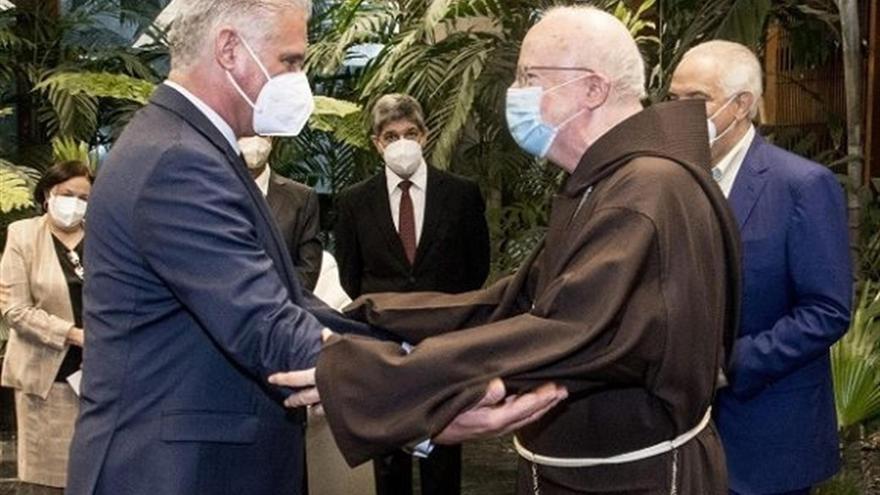
![]() 14ymedio, Havana, 15 September 2021 — On September 9, Boston Cardinal-Archbishop Sean Patrick O’Malley asked President Miguel Diaz-Canel to pardon demonstrators who participated in the July 11 protests in Cuba. The request was specifically for those who had protested peacefully. Authorities responded by defending their position, claiming once again that those who were arrested are being detained because their actions were violent.
14ymedio, Havana, 15 September 2021 — On September 9, Boston Cardinal-Archbishop Sean Patrick O’Malley asked President Miguel Diaz-Canel to pardon demonstrators who participated in the July 11 protests in Cuba. The request was specifically for those who had protested peacefully. Authorities responded by defending their position, claiming once again that those who were arrested are being detained because their actions were violent.
O’Malley chronicled his tour through the island in his blog along with references to the anniversary of the September 11 attacks and stops he made during his brief Caribbean tour to the Dominican Republic and Haiti. In the post, he reveals that he quarantined for only six hours before celebrating mass at the Shrine of the Virgin of Charity of Cobre. People arriving from abroad are required to undergo PCR tests and follow isolation protocols for several days. The cardinal makes it clear, however, that the rule does not apply to high-ranking visitors.
“I also spoke with [President Díaz-Canel] about the demonstrations that took place this summer and asked for a pardon for those who took part in the demonstrations in a non-violent way,” the cardinal briefly notes. In the next line he goes on to mention the Cuban president’s concerns over a drop-off in remittances.
“The government of Cuba is, of course, very concerned that the remittances Cuban-Americans were sending to their relatives are now much more difficult to receive and that the travel possibilities to Cuba have also been greatly restricted. It was a very cordial meeting, and I gave the president a copy of the Holy Father’s latest encyclical, ‘Fratelli tutti’.”
Earlier, O’Malley had participated in a meeting between Catholic Cuban doctors and health care professionals from the New York medical organization SOMOS, who had traveled with O’Malley to Cuba. The same delegation later accompanied him to a meeting of a more political nature, in this case with Foreign Minister Bruno Rodriguez, who recounted the deeds of Cuban health workers around the world.
The cardinal must have been remarkably impressed by the foreign minister’s words. Not only does he make no mention of the abusive conditions under which international brigade doctors must work, but he also criticizes those who question them.
“One of the things the Cubans have done since the revolution is to train large numbers of doctors and send them all over the world. For example, the Foreign Minister told me they have about 250 doctors working in Haiti alone. Of course, the program has come under attack by many, but certainly, the whole area of medical care and public health is a very important part of the ethos of the Cuban Revolution,” he writes.
One of the stops on the tour organized by the government for the cardinal was the Finlay Vaccination Institute. “They are working in conjunction with MIT and several hospitals in the United States and have been able to develop several vaccines that they are distributing to other countries, as well as to the Cuban people. It was impressive to see what the Cubans have done,” he adds.
The cardinal also made several visits of a religious nature, among them a mass on the Feast of the Virgin of Charity of El Cobre at the shrine in Santiago, and a celebration at the tomb of Jaime Ortega, who died in 2019 and who is buried in Havana’s cathedral.
Commenting on the post, Dagoberto Valdés views the visit positively, though he understands the reluctance on the part of the public, who view the archbishop as an emissary sent by Pope Francis to encourage dialogue with the Biden administration, as happened prior to the normalization of diplomatic relations in 2014.
Valdés believes the cardinal’s reference to the July 11 demonstrations as well as the request to allow humanitarian aid to enter Cuba from the United States through Caritas were a good gestures.
Valdés, the founder of the Center for Coexistence Studies views the mention of the collaboration with the Massachusetts Institute of Technology (MIT) as a meaningful development. It is an arrangement that, hitherto, had not been widely known. If true, it would demonstrate — he maintains — that such collaborations do not pose a threat national sovereignty.
“It’s likely that the most important thing about the visit of Pope Francis’ advisor to Cuba is not what was reported but the beginning of a mediation to resolve the conflicts between the governments of Cuba and the United States as well as between the civil society and Cuban leaders. Let’s move beyond from the event to the process. From a past we do not want to repeat to a different present and a future that is truly new,” he says.
Valdés is in favor of real dialogue, not a sham, and if it materializes he demands that it be “for freedom, to move peacefully towards democracy. A dialogue for Patria y Vida (Homeland and Life).”
____________
COLLABORATE WITH OUR WORK: The 14ymedio team is committed to practicing serious journalism that reflects Cuba’s reality in all its depth. Thank you for joining us on this long journey. We invite you to continue supporting us by becoming a member of 14ymedio now. Together we can continue transforming journalism in Cuba.
